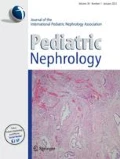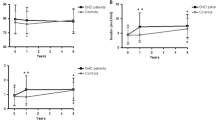Abstract
Growth impairment induced by chronic metabolic acidosis is associated with an abnormal growth hormone (GH)/insulin-like growth factor-I (IGF-I) axis. To examine the potentially beneficial effects of IGF-I on acidosis-induced growth impairment and the influence of GH and IGF-I treatment on the GH/IGF-I axis, three groups of acidotic young rats (untreated, AC, n=12; treated with recombinant human GH, GH, n=8; treated with recombinant human IGF-I, IGF-I, n=8) were studied, and compared with nonacidotic rats fed ad libitum (C, n=9)) or pair-fed with the AC group (PF, n=12). After 14 days of acidosis and 7 days of treatment, growth rate, hepatic abundance of 4.7-kilobase (kb) and 1.2-kb GH receptor transcripts and 7.5-kb and 1.8- to 0.8-kb IGF-I transcripts, serum GH-binding protein (GHBP), and IGF-I concentrations (mean±SEM) were analyzed. Significant decreases of 4.7-kb GH receptor [26±2 vs. 49±6 arbitrary densitometry units (ADU)] and 7.5 kb IGF-I (41±3 vs. 104±10 ADU) transcripts and low serum GHBP (25±1 vs. 32±1 ng/ml) and IGF-I (279±50 vs. 366±6 nmol/l) levels were found in the AC compared with the C rats. The majority of these alterations were also observed in PF rats. Compared with acidotic untreated rats, GH and IGF-I therapy produced no improvement in growth rate. GH treatment normalized the levels of IGF-I mRNA, aggravated the acidosis-related inhibition of the GH receptor gene, and did not modify the serum levels of GHBP and IGF-I. In contrast, IGF-I administration depressed the hepatic expression of all GH and IGF-I transcripts and normalized serum IGF-I concentrations. Our results confirm that sustained metabolic acidosis alters the GH/IGF-I axis, in part because of associated malnutrition, and induced growth retardation that is resistant to GH therapy. Our study also shows that administration of IGF-I does not accelerate the growth of acidotic rats, suggesting a peripheral mechanism, at the level of target tissues, is responsible for the resistance to the growth-promoting actions of GH and IGF-I.
Similar content being viewed by others
Author information
Authors and Affiliations
Additional information
Received: 19 May 1999 / Revised: 26 October 1999 / Accepted: 27 October 1999
Rights and permissions
About this article
Cite this article
Ordóñez, F., Santos, F., Martínez, V. et al. Resistance to growth hormone and insulin-like growth factor-I in acidotic rats. Pediatr Nephrol 14, 720–725 (2000). https://doi.org/10.1007/PL00013425
Issue Date:
DOI: https://doi.org/10.1007/PL00013425




